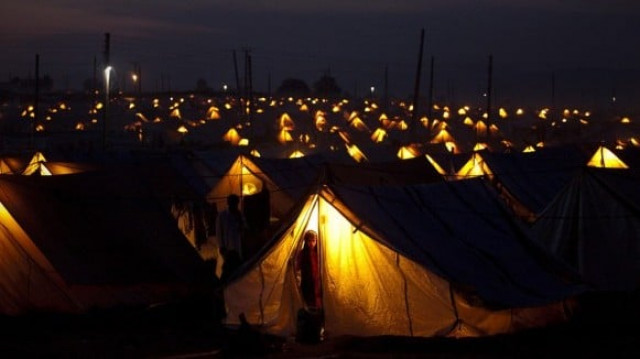Ramazan at an IDP camp in Jalozai: Life is nasty for thousands of camp dwellers
Times are difficult as campers face acute shortages of water, food and electricity.

As dusk starts to fall at Jalozai Internally Displaced Persons (IDPs) camp, a queer calm engulfs the tents dotting the barren landscape.
Occasionally, people scuttle past amid rows of tents in a hurry, carrying pieces of ice in shopping bags and other items for Iftari.
The people of Jalozai camp are the forgotten lot of militancy in the north.
They have seen many winters and summers far away from the comfort of their homes, in tents. However, Ramazan, along with many blessings, brings nostalgia too. People here remember the past where shade, water, fruits and food were plenty while food stipends were a distant reality.
In today’s Jalozai, food stipends have been stopped too, severely hampering the food intake of many families living here. There are also complaints about its quality and quantity.
Fazl Rabbi, a young boy around 14 years, is spending his first fasting season at this camp, away from his home in Alignar area of Mohmand Agency.
“I yearn for trees, back in my hometown,” Rabbi told The Express Tribune. It is almost a year, since Rabbi and his family arrived in this camp. However, Ramazan has been the most difficult time as fasting IDPs face dearth of food, electricity shortfalls as well as an acute shortage of drinking water.
When these IDPs were first displaced, the whole nation opened their purses to help these homeless people generously. They now face homelessness, compounded with misery, due to lack of any institutional help.
The authorities distribute flour, cooking oil and other edibles to some families, while others do not have access to even these. They are instead told by officials to go back to their hometowns, while the IDPs lament that the situation back home does not warrant their return.
“There is no electricity here and we cannot stand the heat as well, since the tents are also worn out,” Rabbi said.
He said that he hoped for peace to return to their areas so that they could return as soon as possible to their homes.
However, other people were more pessimistic than Rabbi.
Mohammad Wahid, a resident of Bajaur agency who is living in this camp since 2008, asserted he too wanted to return to his home, but the security situation was not conducive for that.
Qazi Khan, a resident of Khyber Agency also recalls with wistfulness, iftaris at his home in serene times. “There was life, joy, and sharing in our community, which added colour to our iftaris and sehris,” he said.
Alif Gul, a resident of Bara tehsil of Khyber Agency, is spending his second year at this camp. “We have forgotten the fragrance of fruits and good food here; a modest iftari costs 200 rupees, per family,” he said.
As iftari time draws nearer, people move inside their tents, to quench their thirst after another laborious day.
Ramazan moves on, as these people muster up the courage to go with another fortnight of fasting, under a scorching sun, in this wilderness.
Published in The Express Tribune, August 17th, 2011.













COMMENTS
Comments are moderated and generally will be posted if they are on-topic and not abusive.
For more information, please see our Comments FAQ